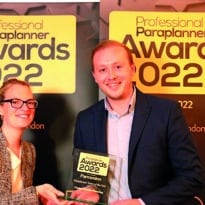AKG has been providing assessment, ratings and other information to the financial services industry for over 30 years. We asked Matt Ward, communications director at AKG, to tell us more about the company and how it can help paraplanners conduct reliable due diligence on providers, platforms, DFMs and other pertinent entities along the value chain.
Briefly, what are the key services that you provide which can help paraplanners in their research of providers and products for client recommendations.
AKG’s financial strength ratings are designed specifically for use in the intermediary market. Importantly, in our company assessment work, we take a specific and distinct perspective – that of the customer, with our ratings and reports designed and delivered for use by advice and paraplanning firms.
We carry out independent assessment of a wide range of companies operating across five sectors – Provider, Offshore, Platform, DFM and International Platform. Paraplanners can therefore use AKG’s financial strength ratings and reports to provide crucial company-level insight, comparison and support when carrying out research and due diligence exercises.
Ratings can be obtained directly from AKG, but to ensure broad market accessibility for paraplanners we have distribution arrangements in place with most third-party research providers for inclusion of AKG ratings within their tools.
Assessment reports are also issued for some companies assessed by AKG to further enhance evidential understanding of financial strength positioning of the company under consideration.
What are the main indicators of ongoing financial strength and sustainability of a product provider that you cover, and why are they important?
AKG’s assessment of financial strength looks at a company’s ability to sustain delivery of its products or services to customers over the longer term. Ensuring, amongst other requirements, alignment with the key Consumer Duty tenet of ensuring positive customer outcomes.
The rating approach and methodology therefore considers a range of contributing factors, including capital and asset position, expense position and profitability, parental strength, operational capability and strategic position.
The rating also reflects factors such as the strength of the business’ management team and the ability of the business to withstand external market forces.
Where companies engage with AKG’s assessment process on a deeper-dive basis we are able gain additional insight from discussions with senior management team members which helps us to further build on our understanding of the company and our rating outlook.
Which of the indicators would you say paraplanners should focus on first when conducting due diligence and/or which give the most insight into a company?
Whilst AKG’s financial strength assessment is of course underpinned by key financial data and metrics, we adopt a balanced scorecard approach to rating companies, ensuring that no one factor is overly dominant in our outlook.
Paraplanners might look at company documents in isolation, for example report and accounts, SFCRs or Pillar III documents, but AKG’s work as a specialist in this area effectively lightens the load for them by providing a rating delivery mechanism which enables paraplanners to carry out company-level comparison within an understandable framework.
Although the assessment behind AKG ratings is complex, the scale used for presentation is deliberately simple to maintain accessibility and comparability. An overall financial strength rating is given for each of the companies assessed by AKG across our sectors, using a consistent rating scale and associated definitions as follows:
‘A’ – ‘Superior’
‘B+’ – ‘Very strong’
‘B’ – ‘Strong’
‘B-‘ – ‘Satisfactory’
‘C’ – ‘Weak’
‘D’ – ‘Very weak’
Depending on which peer sector and which type of product/proposition being considered, paraplanners can decide on their level of tolerance for company financial strength requirements based on this framework.
Switching platform or adding one due to acquisition of a client bank etc, requires significant due diligence. What help can you give paraplanners to enable them to assess platforms when conducting this due diligence?
Platform due diligence exercises should not be underestimated nor treated as box-ticking exercises. From a Regulatory standpoint paraplanners are encouraged to carry out robust, repeatable and recordable processes which cover a range of factors, including consideration of platform operator financial strength.
AKG’s independent and structured assessment work and output is here to help paraplanners understand key company-level considerations and to inform decision making when selecting/retaining platform partners.
Have you been seeing any trends in the market in any of the areas you cover?
An additional component of AKG’s work in assessing individual companies from a financial strength perspective is for us to understand key dynamics and trends impacting on a company’s operating environment. This sees us keeping a close eye on developments across our assessment sectors. Indeed, we also explore some of this in our industry research papers where for example we’ve written about themes including Pension Freedoms, Future of Advice, Intergenerational Planning and Vulnerable Customers in recent years.
Running through all of the key market impact items would be a good feature in its own right, but it would be fair to say that big ticket regulatory, socio-economic and technology trends have been occupying thoughts and creating a host of challenges for most companies. Additionally, M&A activity has been rife across our assessment sectors.
For these reasons, a company’s ability to adapt to change, evolve its proposition and continue to invest in the future, all provide stern tests of its operational financial strength.
Main image: edge2edge-media-t1OalCBUYRc-unsplash






























